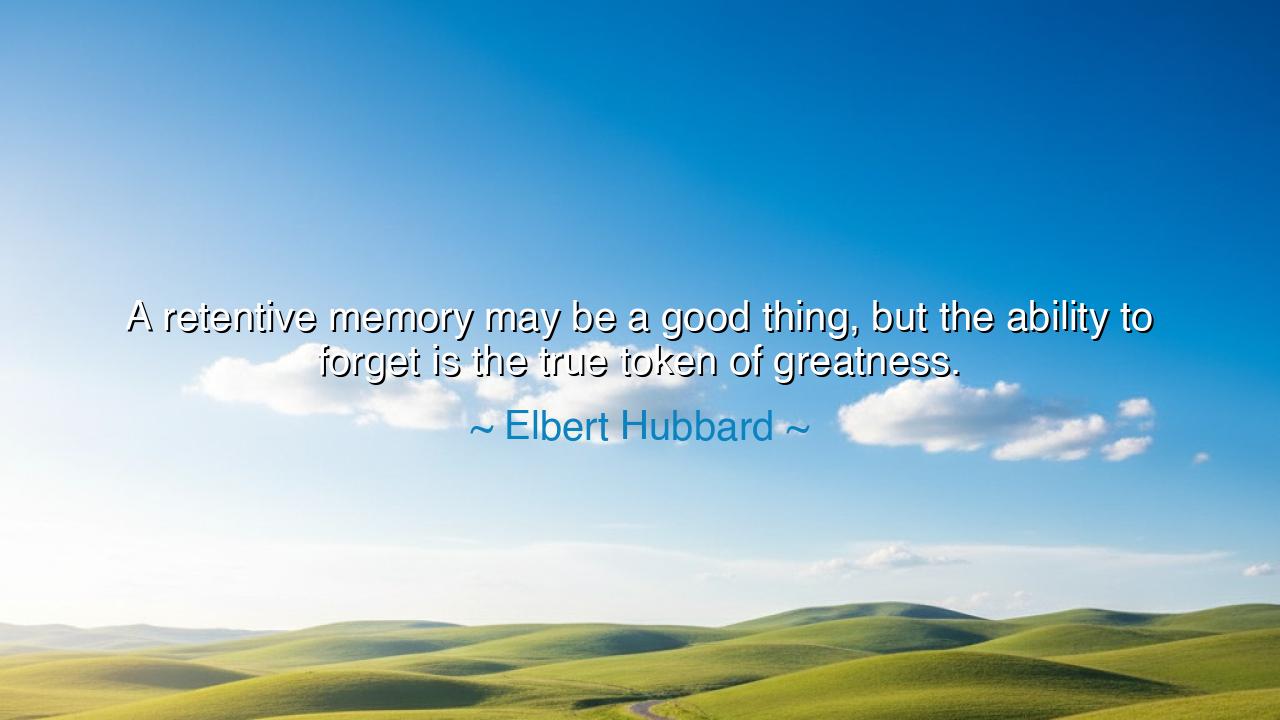
A retentive memory may be a good thing, but the ability to forget
A retentive memory may be a good thing, but the ability to forget is the true token of greatness.






"A retentive memory may be a good thing, but the ability to forget is the true token of greatness." — Elbert Hubbard
In the stillness of reflection, these words of Elbert Hubbard ring like the echo of a temple bell across the ages. The retentive memory—that power to recall every word, every slight, every triumph—seems at first a gift of the gods. To remember is to learn; to recall is to hold power. Yet Hubbard, with the wisdom of an ancient sage, unveils a deeper truth: that true greatness lies not in the chains of remembrance, but in the liberation of forgetting. The one who remembers every wound becomes a prisoner of the past; the one who forgets them walks free, unburdened, radiant, and renewed.
The ability to forget is not weakness—it is divine discipline. To forget is not to erase, but to forgive, to release the bitterness that corrodes the heart. It is to rise above injury and failure, to meet each dawn with the freshness of an unscarred soul. Those who cling to memory alone may build walls around their hearts, thinking they preserve wisdom, but they also preserve sorrow. The wise forget the pain yet keep the lesson; they drop the stone but keep the strength it forged. This is the alchemy of the spirit, transforming wounds into wisdom through the fire of letting go.
Consider the tale of Nelson Mandela, who emerged from twenty-seven years in prison not with vengeance but with peace. His memory was vast—he could have recited every indignity, every injustice—but he chose the greater path of forgetting. He laid down the heavy armor of hatred and lifted instead the banner of reconciliation. By forgetting the bitterness, he became not merely a man of endurance, but a man of greatness, capable of uniting what history had torn apart. Through his example, we see that forgetting is not the loss of memory—it is the victory of the spirit over the past.
Even in the quiet struggles of ordinary lives, this truth endures. Think of the friend who forgives a betrayal, the parent who forgets a child’s harsh words, the worker who leaves behind yesterday’s failure to begin anew. Each act of forgetting is a small act of greatness. It demands courage—greater than that of warriors—for it is the conquest of the self. To forget with grace is to master the storms within, to stand like a mountain unmoved by the tempests of memory.
The ancients taught that the river does not remember the stones it has passed. It flows onward, ever-renewed, finding beauty in the movement, not in the recollection. So too must we learn to flow. When our hearts overflow with the silt of grudges and regrets, our waters grow murky. But when we let those memories sink and dissolve, our lives regain clarity. The great soul forgets not out of carelessness, but out of wisdom, knowing that holding on is death by degrees, and forgetting is life everlasting.
Yet let us not misunderstand. The retentive memory has its place—it preserves knowledge, art, and culture. But the ability to forget preserves peace, humility, and joy. Memory builds the mind, but forgetting builds the soul. The balance between them is the mark of the enlightened: to remember truth and beauty, yet to forget insult and pain. For as the old proverb says, “The heart that forgives is the heart that lives twice.”
So, my child of tomorrow, take this teaching into your days: remember to learn, but forget to hate. When you are wronged, do not let the memory rot within you. When you fail, do not let yesterday’s shadow darken your new dawn. Practice the noble art of forgetting. Begin each morning with a heart unburdened. And one day, when you look back upon your path, you will find that you have walked not only in wisdom—but in greatness.






AAdministratorAdministrator
Welcome, honored guests. Please leave a comment, we will respond soon